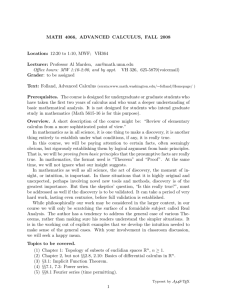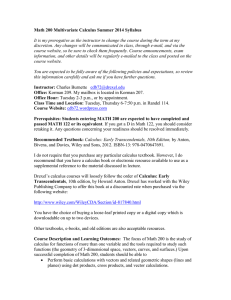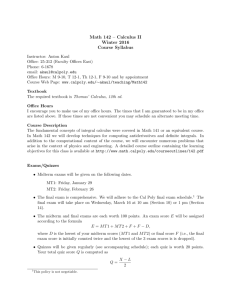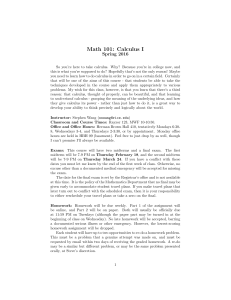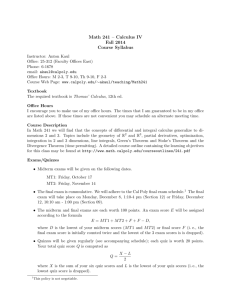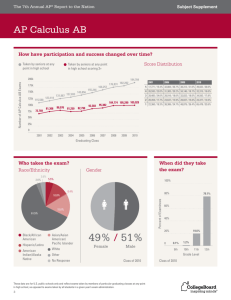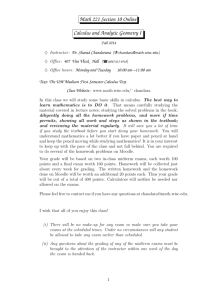MATH 122 Fall 2014 Syllabus
advertisement
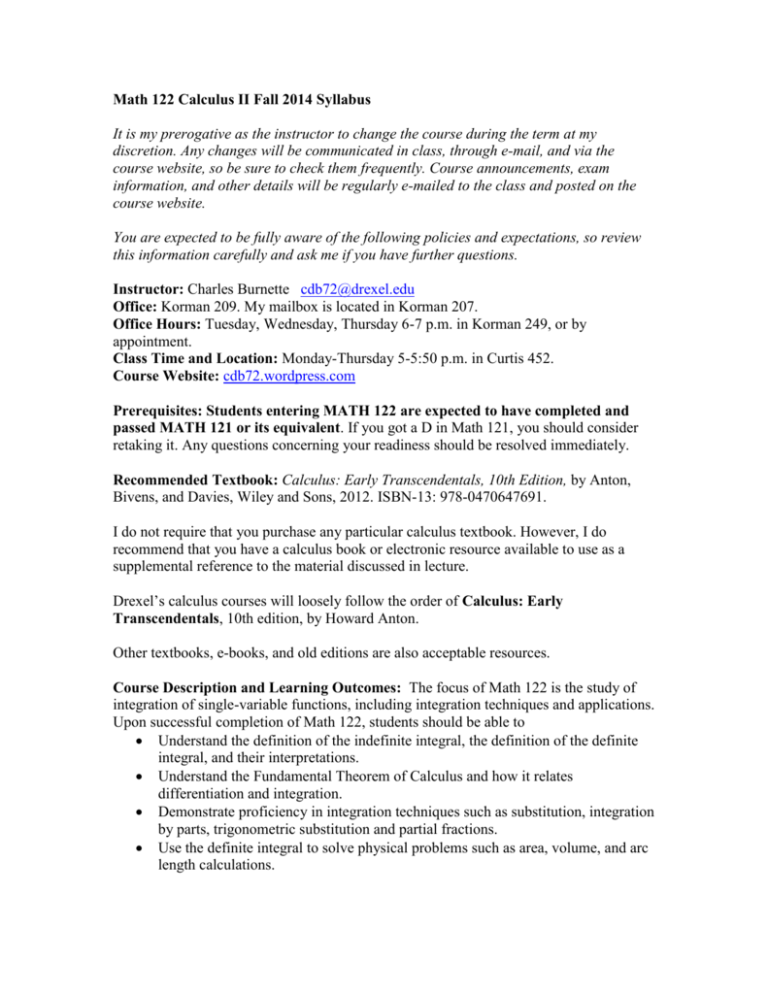
Math 122 Calculus II Fall 2014 Syllabus It is my prerogative as the instructor to change the course during the term at my discretion. Any changes will be communicated in class, through e-mail, and via the course website, so be sure to check them frequently. Course announcements, exam information, and other details will be regularly e-mailed to the class and posted on the course website. You are expected to be fully aware of the following policies and expectations, so review this information carefully and ask me if you have further questions. Instructor: Charles Burnette cdb72@drexel.edu Office: Korman 209. My mailbox is located in Korman 207. Office Hours: Tuesday, Wednesday, Thursday 6-7 p.m. in Korman 249, or by appointment. Class Time and Location: Monday-Thursday 5-5:50 p.m. in Curtis 452. Course Website: cdb72.wordpress.com Prerequisites: Students entering MATH 122 are expected to have completed and passed MATH 121 or its equivalent. If you got a D in Math 121, you should consider retaking it. Any questions concerning your readiness should be resolved immediately. Recommended Textbook: Calculus: Early Transcendentals, 10th Edition, by Anton, Bivens, and Davies, Wiley and Sons, 2012. ISBN-13: 978-0470647691. I do not require that you purchase any particular calculus textbook. However, I do recommend that you have a calculus book or electronic resource available to use as a supplemental reference to the material discussed in lecture. Drexel’s calculus courses will loosely follow the order of Calculus: Early Transcendentals, 10th edition, by Howard Anton. Other textbooks, e-books, and old editions are also acceptable resources. Course Description and Learning Outcomes: The focus of Math 122 is the study of integration of single-variable functions, including integration techniques and applications. Upon successful completion of Math 122, students should be able to Understand the definition of the indefinite integral, the definition of the definite integral, and their interpretations. Understand the Fundamental Theorem of Calculus and how it relates differentiation and integration. Demonstrate proficiency in integration techniques such as substitution, integration by parts, trigonometric substitution and partial fractions. Use the definite integral to solve physical problems such as area, volume, and arc length calculations. Mathematically model a system with descriptive differential equations and be able to find physically meaningful solutions. Demonstrate knowledge of the polar coordinate system, including the techniques and applications for differentiating and integrating polar functions. Course Format: There will be four hours of classes each week. Most classes will be a mixture of lectures, questions and class discussion, and problem sessions. There will be a short quiz each week other than the weeks with a midterm exam. Attendance: Regular attendance is not compulsory, but it is essential for success in Math 122. You are responsible for everything covered in class and cannot use office hours for this purpose. The quarter system moves very quickly—if you do not do your work regularly, it will be easy to fall behind. Assigned Problems: The assigned problems are chosen to illustrate important concepts and techniques that you are expected to master. These problems are for your benefit and should be worked out regularly and in detail. Some of these problems will be discussed in lecture, but it is your responsibility to do all the work on the assigned problems. By doing the problems yourself, you will acquire the skills needed to perform well in this course. These problems will not be turned in nor graded. Reviewing class notes or re-reading the textbook are good ways to determine the solution to assigned problems. Extra Help: I highly recommend that you approach me for extra help during my office hours or to arrange an appointment if necessary. You can also receive assistance on a walk-in basis in the Math Resource Center (MRC), which is open Monday-Thursday 10 a.m - 7 p.m. and Fridays 10 a.m. - 4 p.m., except during finals week. (The hours then will be more limited as many of the tutors in the MRC will have their own finals.) The MRC is staffed by undergraduates, teaching assistants, and faculty who can aid you with your math courses. No appointment is necessary. Hours and staff schedules can be found at: http://drexel.edu/math/resources/undergraduate/mrc Do not wait until the last minute to ask for help if you are having difficulties. This is a course where most of the material is hierarchical, so it is extremely important to seek help early. Grading: Grades are based on the work shown, not on what was intended or implied. Excessively sloppy, poorly justified, or disorganized work will not be given full credit, even if the correct answer appears. Quizzes, two midterm exams, and one comprehensive final exam will constitute your grade for this course. Quizzes: Each Monday (with the exception of exam weeks) there will be a 10-15 minute in-class quiz based on the material covered in the previous week. Each quiz will be worth 10 points. Your lowest quiz score will be dropped. There are no make-up quizzes. You must be present in your scheduled class to take the quiz. Exams: There will be two one-hour midterm exams during the quarter. These exams will be given during the usual class period. The tentative coverage of each midterm exam is: Exam 1: Monday, October 20, 2014, Sct. 5.2-5.6, 5.9 Exam 2: Monday, November 17, 2014, Sct. 6.1, 6.2, 6.4, 6.6, 7.2-7.5, 7.8 An announcement about the exact coverage of an exam will be e-mailed to the class at least one week prior to the exam date. There are no scheduled make-up exams, so it is strongly recommended that you do not miss the regularly scheduled exam. A cumulative make-up exam in week 10 shall only be given in cases of exceptional circumstance, such as illness or injury, with proper documentation provided. In fairness to other students, such an exam will be somewhat longer and more difficult than the midterm. Exams may not be retaken for ANY REASON. All exams are closed book and closed notes. Final Exam: There will be a two-hour cumulative final exam scheduled during the final exam week at the end of the quarter. The exact date and time will be determined by the registrar. Do not make travel plans until after the announcement of the final exam date. You are expected to take the exam at the time scheduled by the registrar! Course Grades: Your course average will be computed in one of two ways: If your final exam grade is not your highest exam grade, then your grade will be computed: 20% quiz average 25% each midterm 30% Final Exam. If your final exam grade is your highest exam grade, then your grade will be computed: 20% quiz average 15% lower midterm 25% higher midterm 40% final exam. The letter grade you receive will be based on your course average as follows: 90 - 100 A 80 - 89 B 70 - 79 C 60 - 69 D 0 - 59 F Plus and minus grades will be assigned at my discretion. Calculators: Calculators are NOT ALLOWED for quizzes or exams. Disabilities and Accommodations: Students with disabilities may request accommodations (e.g. extended time on exams). Students must provide me with an Accommodation Verification Letter (AVL) before any accommodations are granted. Details and procedures can be found at: http://www.drexel.edu/oed/disabilityResources/students/ Course Drop Policy: Students should be familiar with the drop policy: http://www.drexel.edu/provost/policies/course_drop.asp http://www.drexel.edu/provost/policies/pdf/course_withdrawal.pdf Classroom Etiquette: Be respectful of the entire class. If you wish to use your cell phone, tablet, laptop, etc., please sit in the back of the room and keep the volume down. If you cause any major distractions or behave disruptively, then you will be kicked out of class for the rest of the lecture and will not be allowed to return until you apologize to me in person. Academic Honesty: Cheating and other forms of academic misconduct are serious offenses and are dealt with harshly (e.g. at the very least a 0 on the exam or quiz and a letter sent to the Office of Student Conduct.) A copy of the student code of conduct in the student handbook can be found at: http://www.drexel.edu/provost/policies/academic_dishonesty.asp http://www.drexel.edu/studentaffairs/community_standards/studentHandbook/general_inf ormation/code_of_conduct/ Important Dates: September 22, 2014: First Lecture October 3, 2014: Last day to Add/Drop a course with Academic Advisor assistance October 5, 2014: Last day to Add/Drop a course via DrexelOne by 11:00 p.m. October 13, 2014: Columbus Day (University Holiday) October 20, 2014: First Midterm Exam November 7, 2014: Last day to withdraw from a course with academic advisor assistance November 17, 2014: Second Midterm Exam November 26-31, 2014: Thanksgiving Break December 4, 2014: Last Lecture December 8-13, 2014: Final Exam Week Tentative Topic Schedule (Subject to Change): 1. The Indefinite Integral, Integration by Substitution (Sections 5.2, 5.3) 2. Area as a Limit, Sigma Notation, The Definite Integral (Sections 5.4, 5.5) 3. The Fundamental Theorem of Calculus, More Integration by Substitution (Sections 5.6, 5.9) 4. Area Between Two Curves, Volume by Slicing (Disks and Washers) (Sections 6.1, 6.2) 5. Length of a Plane Curve, Work, Integration by Parts (Sections 6.4, 6.6, 7.2) 6. Trigonometric Integrals, Partial Fractions (Sections 7.3, 7.5) 7. Trigonometric Substitution, Improper Integrals (Sections 7.4, 7.8) 8. Modeling with Differential Equations, First Order Differential Equations (Sections 8.1, 8.2) 9. Parametric Equations, Calculus of Parametrically Defined Functions, Polar Coordinates (Sections 10.1, 10.2) 10. Calculus in Polar Coordinates (Section 10.3) Less or additional topics may be covered, contingent on time. Chapter numbers and titles correspond to Calculus: Early Transcendentals, 10th edition, by Anton.

